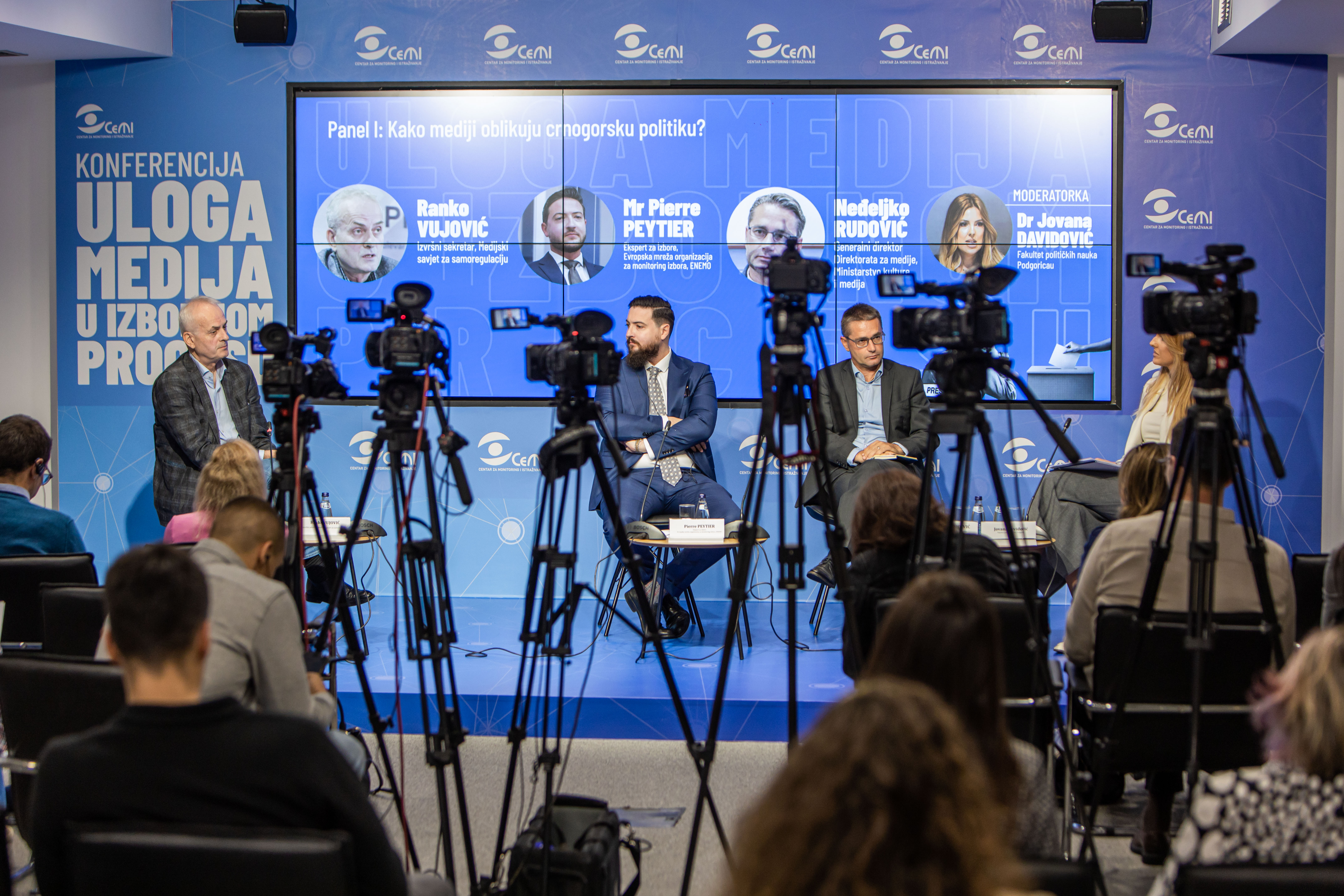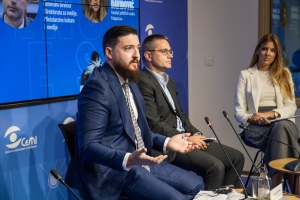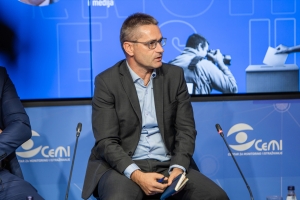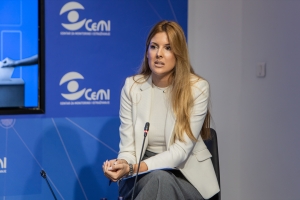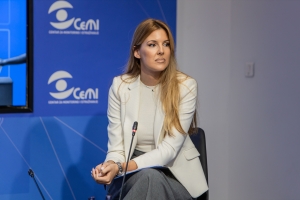The fight against disinformation is global, and there is still no unified defense mechanism. In Montenegro, when it comes to manipulation, the greatest challenge comes from social networks and media from the region, while the most influential traditional media mostly adhere to an ethical code.
This was announced from the panel "How do the media shape Montenegrin politics?", at the conference "The Role of the Media in the electoral process in Montenegro", organized by the Center for Monitoring and Research (CeMI).
Executive Secretary of the Media Self-Regulation Council, Ranko Vujović, said that Montenegrin media, compared to those from the region, are more subtle and skilled in journalistic techniques, so it is not always easy to recognize manipulation.
"You have media that are close to pro-Serbian or pro-Russian positions, but they will not directly promote Serbia, Russia, or Putin, but they will criticize the opponents of Serbian and pro-Russian politics in Montenegro. This is completely legitimate and within professional standards. So you have different techniques of manipulation, which move within the scope of the profession, in order to achieve your goal," Vujović said.
He explained that everywhere in the world the media have the right to a political orientation and to favor a certain policy, as long as they adhere to professional and ethical standards.
"I wouldn't say it's only a problem here. Montenegrin media are recognizable by which political option they represent, but that isn’t comparable to what’s happening in the region and with the media working in the region, which are visible in Montenegro, or their newspapers are sold here," Vujović said.
He identified social networks and regional media as the main problem in Montenegro when it comes to disinformation.
"Traditional media themselves are not as crucial to the disinformation and manipulation narrative as regional media in Montenegro and social networks. The developed world doesn't have an answer to the manipulation that occurs with disinformation, especially when it comes to elections. So, what can we expect in Montenegro? What mechanisms does it have to counter the onslaught of disinformation?" Vujović questioned.
When it comes to regulations regarding foreign ownership in the media in Montenegro, he noted that a prerequisite for establishing a media outlet in Montenegro is registering a company in our country.
"The Montenegrin company owns the media, not a foreign company owns the media." Montenegrin legislation, when it comes to media ownership, is fully aligned with the European Union Directive on audio-visual media services. It's true, we still haven't implemented the revised Directive from 2018," Vujović said.
The Director-General of the Directorate for Media, Ministry of Culture and Media, Neđeljko Rudović, stated that it isn’t unusual for a media outlet to support a particular ideology, but the problem, as he explained, arises when it uncritically supports a specific political party that represents that ideology and turns into a propaganda mouthpiece for that party.
"We in Montenegro have a very diverse media scene. When it comes to Montenegro, and when we talk about respecting the basic ethical rules from the Code of Journalists and the Law on Media, we have a situation that isn’t so black. Montenegro is a unique case where the most influential media outlets, the ones most trusted, generally adhere to an ethical code. These are not tabloids or various television channels with programs that cater to the lowest societal needs or passions. These are serious traditional media outlets that are the most influential in our country," Rudović stated.
The media shape the political scene to a large extent, as he said, and their role is very important when it comes to the culture of dialogue and tolerance.
"Disinformation, hate speech, i.e. problems that represent a real social danger are regulated up to one level, in such a way that they are criminal acts that are found in the Criminal Code of Montenegro and that they are legal offenses that are regulated by the Law on Public Order and Peace, with the Law on Media," said Rudović.
It is planned to form, as he announced, a Network for the fight against hate speech, online harassment, and disinformation, the bearer of which would be the University of Montenegro, which would bring together representatives of the media community, civil society, the media, and various other organizations that deal with false news.
"This network would have the credibility and legitimacy to point the finger daily at those who deceive us and spread hate speech, with the aim of publicly shaming that individual and recognizing them as someone undermining the foundations of our society. A media strategy has been adopted, and when it comes to this measure, we have already taken certain steps," Rudović explained.
He pointed out that it is possible for media outlets that aren’t from Montenegro to shape public opinion in Montenegro. That's why he believes that the domestic response to potential challenges and dangers must be very wise.
"In the Law on Audio Visual Media Services, we finally decided that the rate of self-production of all media in Montenegro must be defined by law and must be much higher than it is now, so it will be 20 percent." This means that all media, whoever owns them, are obliged to respect Montenegrin laws," explained Rudović.
In his opinion, the working conditions of journalists in the Montenegrin media are not nearly as good as they should be.
"The average salary in the media is very low, perhaps even below the general average wage in Montenegro, and I believe that this is a serious problem that requires a wise response. In the new Media Law, it is proposed that the Media Pluralism Fund be more than 100% larger than it is now," Rudović said.
The election expert at the European Network of Election Monitoring Organizations (ENEMO), Pierre Peytier, stated that in regard to the recently held presidential and parliamentary elections, there are visible improvements compared to previous electoral processes, but there are still many open questions.
"Fake news contributes to the polarization of the media space. When it comes to the electoral process, there are numerous examples, such as fake public opinion surveys, fake websites that direct you to websites with problematic sources of information, and this is simply not solved in a fishy way, but with a holistic approach," said Peytier.
He noted that the Agency for Electronic Media had a more proactive role in monitoring the media during the pre-election campaign, but one of the limitations, in his view, is the fact that legal instruments and possibilities for sanctions are very limited.
As Peytier explained, the Media Strategy for the period 2023-2027 is a comprehensive document that can strengthen the framework, and it is very promising that representatives of the government, non-governmental organizations, and the media are included to identify shortcomings and problems and to take practical steps to protect society from negative influences.
"When it comes to electoral processes with specific threats, there must be means and mechanisms in place to further regulate the space. It is essential to regulate, but also to have a set of standards and rules that can be adapted to each specific context," Peytier explained.
